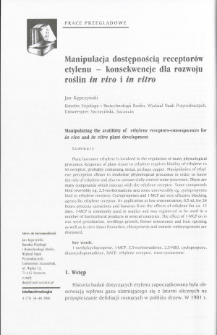
Obiekt
Tytuł: Manipulacja dostępnością receptorów etylenu - konsekwencje dla rozwoju roślin in vivo i in vitro
Inny tytuł:
Wydawca:
Komitet Biotechnologii PAN ; Instytut Chemii Bioorganicznej PAN
Abstrakt:
Plant hormone ethylene is involved in the regulation of many physiological processes. Response of plant tissue to ethylene requires binding of ethylene to its receptor, probably containing metal, perhaps cupper. Manipulation of ethylene perception allows to modulate physiological processes in order to know the role of ethylene and also to commercially control some processes. There are many compounds which interact with the ethylene receptor. Some compounds bind reversibly eg. 2,5-norbornadiene and some unreversibly eg. cyclopropenes bind to ethylene receptor. Cyclopropenes and 1-MCP are very effective blocking agents for ethylene receptor. Its application at low concentration, 0.5 nl, for 24 hours protects carnations and bananas from the effects of ethylene for ca. 12 days. 1-MCP is commonly used in studies and was registered to be used in a number of horticultural products in several countries. The effect of 1-MCP on in vivo seed germination, seedlings growth, flower senescence and fruit ripening as well as in vitro shoot formation, rhizogenesis and somatic embryogenesis are discussed.
Czasopismo/Seria/cykl:
Biotechnologia, vol.75, 4 (2006)-.
Tom:
Zeszyt:
Strona pocz.:
Strona końc.:
Szczegółowy typ zasobu:
Format:
Identyfikator zasobu:
0860-7796 ; oai:rcin.org.pl:87227 ; IChB B-71
Źródło:
Biblioteka Instytutu Chemii Bioorganicznej PAN
Język:
Język streszczenia:
Zakres czasowy:
Prawa:
Licencja Creative Commons Uznanie autorstwa-Na tych samych warunkach 4.0
Zasady wykorzystania:
Digitalizacja:
Instytut Chemii Bioorganiczneji Polskiej Akademii Nauk
Lokalizacja oryginału:
Instytut Chemii Bioorganiczneji Polskiej Akademii Nauk
Dofinansowane ze środków:
Dostęp:
Kolekcje, do których przypisany jest obiekt:
Data ostatniej modyfikacji:
2 paź 2020
Data dodania obiektu:
7 gru 2019
Liczba pobrań / odtworzeń:
868
Wszystkie dostępne wersje tego obiektu:
https://rcin.org.pl/ichb/publication/113704
Wyświetl opis w formacie RDF:
Wyświetl opis w formacie RDFa:
Wyświetl opis w formacie OAI-PMH:
| Nazwa wydania | Data |
|---|---|
| Manipulacja dostępnością receptorów etylenu - konsekwencje dla rozwoju roślin in vivo i in vitro | 2 paź 2020 |
Obiekty Podobne
Borkowska, Bożenna
Ziółkowski, Piotr Babula- Skowrońska, Danuta Kaczmarek, Małgorzata Cieśla, Agata Sadowski, Jan
Nowak, Jacek K.
Kępczyński, Jan Kępczyńska, Ewa
Kępczyński, Jan Kępczyńska, Ewa
Kępczyńska, Ewa Zielińska, Sylwia Kępczyński, Jan

 INSTYTUT ARCHEOLOGII I ETNOLOGII POLSKIEJ AKADEMII NAUK
INSTYTUT ARCHEOLOGII I ETNOLOGII POLSKIEJ AKADEMII NAUK
 INSTYTUT BADAŃ LITERACKICH POLSKIEJ AKADEMII NAUK
INSTYTUT BADAŃ LITERACKICH POLSKIEJ AKADEMII NAUK
 INSTYTUT BADAWCZY LEŚNICTWA
INSTYTUT BADAWCZY LEŚNICTWA
 INSTYTUT BIOLOGII DOŚWIADCZALNEJ IM. MARCELEGO NENCKIEGO POLSKIEJ AKADEMII NAUK
INSTYTUT BIOLOGII DOŚWIADCZALNEJ IM. MARCELEGO NENCKIEGO POLSKIEJ AKADEMII NAUK
 INSTYTUT BIOLOGII SSAKÓW POLSKIEJ AKADEMII NAUK
INSTYTUT BIOLOGII SSAKÓW POLSKIEJ AKADEMII NAUK
 INSTYTUT CHEMII FIZYCZNEJ PAN
INSTYTUT CHEMII FIZYCZNEJ PAN
 INSTYTUT CHEMII ORGANICZNEJ PAN
INSTYTUT CHEMII ORGANICZNEJ PAN
 INSTYTUT FILOZOFII I SOCJOLOGII PAN
INSTYTUT FILOZOFII I SOCJOLOGII PAN
 INSTYTUT GEOGRAFII I PRZESTRZENNEGO ZAGOSPODAROWANIA PAN
INSTYTUT GEOGRAFII I PRZESTRZENNEGO ZAGOSPODAROWANIA PAN
 INSTYTUT HISTORII im. TADEUSZA MANTEUFFLA POLSKIEJ AKADEMII NAUK
INSTYTUT HISTORII im. TADEUSZA MANTEUFFLA POLSKIEJ AKADEMII NAUK
 INSTYTUT JĘZYKA POLSKIEGO POLSKIEJ AKADEMII NAUK
INSTYTUT JĘZYKA POLSKIEGO POLSKIEJ AKADEMII NAUK
 INSTYTUT MATEMATYCZNY PAN
INSTYTUT MATEMATYCZNY PAN
 INSTYTUT MEDYCYNY DOŚWIADCZALNEJ I KLINICZNEJ IM.MIROSŁAWA MOSSAKOWSKIEGO POLSKIEJ AKADEMII NAUK
INSTYTUT MEDYCYNY DOŚWIADCZALNEJ I KLINICZNEJ IM.MIROSŁAWA MOSSAKOWSKIEGO POLSKIEJ AKADEMII NAUK
 INSTYTUT PODSTAWOWYCH PROBLEMÓW TECHNIKI PAN
INSTYTUT PODSTAWOWYCH PROBLEMÓW TECHNIKI PAN
 INSTYTUT SLAWISTYKI PAN
INSTYTUT SLAWISTYKI PAN
 SIEĆ BADAWCZA ŁUKASIEWICZ - INSTYTUT TECHNOLOGII MATERIAŁÓW ELEKTRONICZNYCH
SIEĆ BADAWCZA ŁUKASIEWICZ - INSTYTUT TECHNOLOGII MATERIAŁÓW ELEKTRONICZNYCH
 MUZEUM I INSTYTUT ZOOLOGII POLSKIEJ AKADEMII NAUK
MUZEUM I INSTYTUT ZOOLOGII POLSKIEJ AKADEMII NAUK
 INSTYTUT BADAŃ SYSTEMOWYCH PAN
INSTYTUT BADAŃ SYSTEMOWYCH PAN
 INSTYTUT BOTANIKI IM. WŁADYSŁAWA SZAFERA POLSKIEJ AKADEMII NAUK
INSTYTUT BOTANIKI IM. WŁADYSŁAWA SZAFERA POLSKIEJ AKADEMII NAUK
































